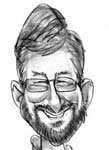When I first saw the report on TV, my initial reaction was that an atheistic display near the Nativity scene is going to be inevitable given the present age of political correctness, fairness, and a lethargic acceptance on the part of the general public, who just accept anything they are told by the media and politicians. After all, they ask, isn’t this a democracy? Doesn’t the constitution provide for free speech? If Christians are allowed a Nativity scene, why can’t anybody have their own display as well?
Let’s examine that approach. For me it seemed to start with the reaction of that “fair and balanced” TV personality: Bill O’Reilly. He seems to be outraged by the sign next to the Nativity scene in the Rotunda of the
Original meaning of Christmas
Most Christians readily inform us that Christmas is the season in which we remember the birth of Jesus, Son of God, who was born as a mortal human child. He lived the perfect life, resisted temptations, taught us how to live, and then died on our behalf with the blame for our sins placed upon Him. He rose again to conquer death and ascended into Heaven after revealing Himself to His disciples. We exchange gifts as a symbol of the great gift of salvation that He offers to those who repent and accept Him as their Lord.
Traditional American Christmas
We have to ask ourselves how such a profound holiday became such a trivial season of overindulgence and merriment. Everybody (well – we know that’s an exaggeration) loves to celebrate Christmas, but instead of carols on the media we hear about Rudolf the Red Nosed Reindeer. We sing Jingle Bells, and dream of a white Christmas. Instead of decking the halls . . ., we deck the malls! Children remember the season as all about Santa Clause. They learn how an angel gets its wings, from watching “It’s a wonderful life”. We decorate a large tree (now called a “holiday tree”), and instead of going to church, we watch “Elf” on TV. We don’t wish people a “happy Christmas”, but “happy holidays”. (I never liked “merry” Christmas anyway, because that word implies inebriation). We experience traffic jams, get trampled in the rush for bargains, and we overeat, overspend and over-indulge. Then it’s all over, and we have to dismantle the tired decorations and get on with life.
Christmas has long been a heathen festival in which Christ has been kept very much in the background. Ask the average American what Christmas is about, and you will get something about good will and peace. It’s the kind of deception that Satan loves! I am really surprised that atheists don’t support this festival! It takes our minds off religion. It’s right up their alley!
The onslaught against religion
While we Christians have been lulled into lethargy, the world has not been idle. Based on what appears to be compassionate principles, we have been persuaded to exercise tolerance towards our neighbor (doesn’t the Bible say “love one another”?). So as not to rock the boat, we have succumbed to politically correct terminology, which sometimes means that we support a lie. Many words have come to mean something else; a euphemism for what originally would have been shunned or condemned. Standards slide because some might otherwise be offended.
So as not to offend others we have allowed “Christmas” to become “
We have established a democracy so that the majority in any voting will carry the day. But we compromise the will of the people with an argument favoring the minority because “it isn’t fair”; thus the will of the people is overruled. Let’s see what happens to Prop. Eight in
While Christians avoid conflict, the Church avoids its responsibility to teach and evangelize. Like the Church in
Read the history of the church – you’ll see what I mean. Study the Old Testament troubles of the Children of Israel who suffered whenever they drifted from God. To avoid disaster, Christians must make a stand. It’s not easy, and it will get harder.
The Message of Christmas today
Thank God that the decline in
Here’s something to think about: It is true that we are taught to love one another. Does that include ignoring their wrongdoings and allowing them to face God’s retribution? Does loving one another allow us to tolerate their misdeeds, immorality and unbelief? Surely we must love the person; but not necessarily their actions or morals.
We must not stand idly by. Those atheists won’t stop at Christmas! I fear that living a Christian life in this world will become ever more difficult. We must either make a stand or we will fall by the wayside. Christians must be as persistent and true to God’s message as the detractors of Christian standards have been to theirs. “Whosoever therefore shall confess me before men, him will I confess also before my Father which is in heaven”. Matt 10:32
I gladly wish you all a very happy and blessed Christmas, and a prosperous new year.
Note
I have been disappointed by Bill O’Reilly. He had me hanging onto every word in his early days on Fox News, but slowly I realized that his urge to be “fair and balanced” left him largely without a message, in spite of his very convincing act as a force to be reckoned with. Somebody once wrote “If you don’t stand for something, you’ll fall for anything”. In my opinion, that has proved to be very true in O’Reilly’s case. For that reason he seems to me to have annoyed many who initially relied on him as a leader in the fight for truth. My own support for him was finally lost on the night he displayed such a dismal lack of preparation for his interview with Michael Moore. During that interview, he let some ridiculous statements by
He and Van Susteren should exchange time slots. I guess he’ll call me a pinhead! I deserve that!

